Australian Tumbleweeds
Australia's most opinionated blog about comedy.
Earlier this year we wrote a little about how Mad as Hell, as basically the last ABC comedy program still in existence, was having a bit of fun using all the old laff-getting tricks that other shows used to mess around with. Back then we were generally approving: little did we realise they were about to make use of the “trick” we’ve enjoyed the least in all our years of watching satirical comedy – getting actual politicians to appear.
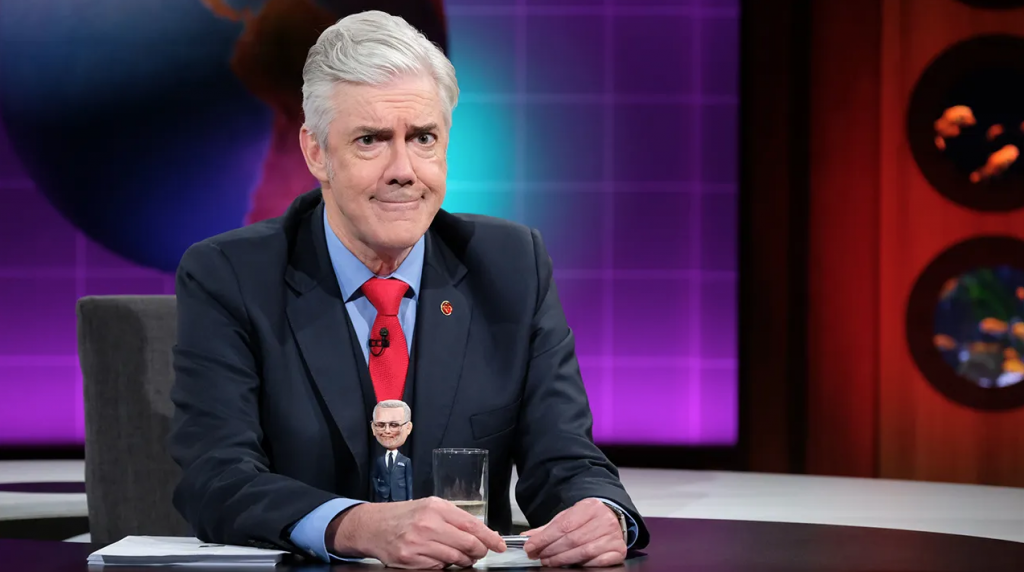
In theory it’s certainly not the worst thing ever – that would be… oh, let’s say Peter Helliar this week. But as anyone who remembers those long, long years when “the Chaser boys” ruled ABC satire, having politicians on is often a short cut to a dull, stilted scene where the only joke is the idea that the politicians themselves thought this appearance would make them more relatable.
At least the surprise appearance of Mathias Cormann on this year’s final episode involved a politician who’s heading out the door, so there wasn’t the whiff of someone’s PR department trying to get them on a popular show to prove they’re “just like us” (especially as part of the joke is that he somewhat resembles a killer robot from the future). And it was a nice send off for one of Mad as Hell’s longest-running and most consistently entertaining characters – though it’s not hard to imagine them finding a way to bring him back if they really, really wanted to.
Otherwise, Mad as Hell continues to be the best comedy program on the ABC by a margin that’d be even more impressive if it wasn’t the only comedy program on the ABC. It’s an unalloyed pleasure to be able to watch a comedy that’s so sure-footed, so nimble and completely in control of what it’s trying to say. There may be the occasional bum note or wobbly joke, but that’s almost always down to a matter of personal taste: this is the rare (recent) Australian comedy where all those involved both know what they’re doing and have the ability to actually do it in a fashion that’s both clear and funny.
There was a long stretch there where each season finale of Mad as Hell was filled with trepidation: would it be coming back? Erratic scheduling, a strong sense that The Weekly was being pushed as a replacement and the self-evident fact that Shaun Micallef has other employment options combined to make Mad as Hell‘s ongoing survival seem a bit iffier than it should have been. Thankfully it seems those days are past: everybody knows they’re onto a winner here. Long may what has clearly become an ABC institution reign.
Also, who doesn’t love The Ramones?
Press release time!
Nick Hayden appointed ABC Head of Entertainment
The ABC has appointed innovative creative and content maker Nick Hayden as Head of Entertainment, driving its popular slate of programs such as Gruen, Hard Quiz, Mad As Hell, The Weekly, You Can’t Ask That and the upcoming Reputation Rehab.
Since joining the ABC in 2016, Nick has created the COVID-19 friendly comedy At Home Alone Together, Whovians, Tonightly and the Australia Talks live show, which revealed the attitudes, behaviours and experiences of the nation. He also developed and produced the Spicks and Specks Reunion Specials, The House with Annabel Crabb and Why Are You Like This – part of the ABC’s Fresh Blood initiative to support emerging comedic talent. He has been ABC Entertainment Manager since 2019.
Sally Riley, ABC Head of Drama, Entertainment & Indigenous content, welcomed Nick’s appointment. “Nick has shown great instinct and drive for developing and producing entertainment shows. He has passion and enthusiasm for new ideas and talent, along with a genuine interest in fostering and protecting the ABC’s current slate of shows,” she said. “I look forward to collaborating with him on our award-winning Entertainment slate and strategy in the years to come.”
Nick said: “The ABC has always been the home of creative risk taking – where else would you be allowed to make a new show in six weeks in the middle of a pandemic? The screen industry needs that kind of support now more than ever, so it’s a genuine honour to take on the role of Head of Entertainment within an organisation I love.”
The ABC’s award-winning Entertainment slate also includes Tomorrow Tonight, Julia Zemiro’s Home Delivery, Sammy J, The Yearly, the Melbourne International Comedy Festival, the ABC’s New Year’s Eve Fireworks show, Dream Gardens, live music show The Set and documentary Recovery: The Music & The Mayhem.
The ever-genial Nick previously created and was founding executive producer of The Feed for SBS and a member of Hungry Beast, under Andrew Denton and Anita Jacoby. He’s also spent a large amount of time in the advertising world but doesn’t tell his ABC colleagues this. Nick has no problem boasting about himself in the third person.
So yeah, while the ABC has an actual Head of Comedy, it’s the Head of Entertainment – this guy – who oversees much of what we currently think of as “ABC comedy”. Well, maybe not The House with Annabel Crabb.
As usual, what’s important here isn’t the press release guff about the ABC being “the home of creative risk-taking” – a line which may very well be the ABC’s greatest contribution to comedy this year – but what Hayden did before scoring the top job. A former advertising guy is now the boss at Gruen? It’s possible he could use his inside knowledge to encourage them to go after the industry’s weak spots… but probably not.
Otherwise what his resume – or the parts available on IMDB – suggests is an ABC company man who’s slowly worked his way up the ranks helping produce a fair amount of largely forgettable programming to get where he is today. Which makes sense, as Entertainment seems much more an area where the ABC looks to develop concepts in house or to exploit already established personalities rather than searches for new ideas from outside. Put another way, when the second item listed on a press release praising your achievements is a television show where people sit around talking about another television show, your “enthusiasm for new ideas” may not have been what got you over the line.
That said, it’s probably good timing that the ABC now has someone officially in the seat in charge of the upcoming Reputation Rehab, because we’ve got the press release for that one lying around here somewhere and… whew. Maybe that one snuck through while nobody was paying attention – but that’s for another post.
The moral of the story is, the producer of Whovians is now technically in charge of Mad as Hell. The system works!
So last week this happened:
Which, after a bit of digging around, turned out to be from this story:
On Tuesday, the 34-year-old told The Herald Sun that Chris, 45, ‘won’t learn’ from the backlash he received from his blackface characters in his sketches – stating he ‘hasn’t accepted the ramifications for what he’s done’.
‘Chris Lilley didn’t do these shows last week, and he’s not the only one,’ he said.
‘He became the poster child for that cancel moment… but you can still download and buy his products. It’s not like he’s going anywhere.’
He went on to say that there was many people who sat around and allowed the sketch to be made at the time, thinking it was a ‘good idea’.
Taking a swipe at the comic, he added: ‘This isn’t a teachable moment yet because he hasn’t learnt. He hasn’t accepted the ramifications of what he’s done.’
Which seems to have been set off by this:
Netflix has this morning removed four Chris Lilley series from its library following increased scrutiny over his portrayal of non-white characters.
We Can Be Heroes, Summer Heights High, Angry Boys and Jonah From Tonga have all been removed.
Which happened… three or so months ago? So why is this news now?
As far as we can figure out, a few of the usual right-wing media figures have been banging on about Lilley lately, using the tried and tested “hey, remember how you used to like this thing but now you can’t because of political correctness? Doesn’t that make you angry?” method of trying to rile up their audience.
This is Australia, so who knows? It might work. It was barely a decade ago that we had a Hey Hey It’s Saturday revival that put blackface back on our screens, after all. Though you might have noticed literally nobody is calling for Daryl Somers to make yet another comeback now.
The problem with trying to stir this shit up yet again is that it’s simply not controversial to say in 2020 that Chris Lilley lost his audience because people stopped finding his act funny. They stopped because as social values shifted, the values his shows were built on became outdated and offensive. His comedy didn’t age well and he never moved with the times. He’s old news.
People who want to laugh in 2020 aren’t turning to Chris Lilley, and people in 2020 who are defending Chris Lilley aren’t doing it because they still think he’s funny. They’re trying to make him a symbol of “the good old days”, when it was okay to laugh at a white guy pretending to be Asian or Islander or Black or a teenage girl and shit, we’re still haunted by that scene in the last episode of Ja’mie Private School Girl where Lilley CGI’d his head onto an actual topless woman’s body and fuck it, this conversation is over.
Press release time!
(geez, it’s been a while – it’s almost as if the industry is in crisis or something)
Comedy series All My Friends Are Racist heading in to production

Enoch Mailangi, Bjorn Stewart, Kodie Bedford
Screen Australia has announced production funding for a new five-part comedy series for ABC iview, with support from Screen Queensland. All My Friends Are Racist follows two Zoomer best friends who make a pact to call their racist friends out, but instead of causing a revolution… they themselves get cancelled.
Created and written by Enoch Mailangi, winner of RAW, a First Nations writers workshop conceived by Artology with the support of Leah Purcell, Wayne Blair and Kyas Hepworth, former Head of AFTRS Indigenous; the series will be directed by Bjorn Stewart (At Home Alone Together, Killer Native) with Kodie Bedford (Robbie Hood, Grace Beside Me) writing and co-producing.
The series is centred on digital natives Casey and Belle who live together in the big smoke. He’s a gay Aboriginal influencer, she’s an Aboriginal budding lawyer. They are the hottest friendship in town and the party is always at theirs. Life couldn’t get sweeter for these first-generation rich kids. But when their ‘burn book’ wall, where they’ve listed all their friends as racists, is discovered, they are suddenly ousted from the friendship group. The pair need to make a decision on who and what they are willing to lose to finally grow up.
Produced and executive produced by Liliana Muñoz launching Maximo Entertainment’s first scripted series, All My Friends Are Racist is executive produced by Hoodlum Entertainment’s Nathan Mayfield and Tracey Robertson (Five Bedrooms, Tidelands), Leah Purcell and Bain Stewart (The Drover’s Wife: The Legend of Molly Johnson), with Hoodlum’s Deborah Glover also producing.
Screen Australia’s Senior Online Investment Manager, Lee Naimo, said, “From first reading the scripts for this distinctive project, it was clear that writer Enoch has perfectly created a unique and hilarious friendship between Casey and Belle throughout this outrageously funny and subversive series. Together with Kodie Bedford and Bjorn Stewart who have a solid track record of creating comedy, they are set to deliver a unique series that I’m confident will engage viewers.”
Executive Producer of ABC Indigenous Margaret Ross said “ABC Indigenous are thrilled to be working with emerging screenwriting talent, Enoch Mailangi to bring their creative vision to life with All My Friends Are Racist. Enoch is certainly one to watch, a bold new voice with the comedic flare and timing of a writer well beyond their years. An irreverent and laugh-out-loud web series, we can’t wait to share with our audiences what the talented teams at Maximo Entertainment and Hoodlum Entertainment have crafted.”
Enoch Mailangi said, “I hope this series shows the liberating power young queer people of colour can have when they decide to sleep in, start drama, and more importantly stuff-up whilst trying to figure out who they are. The experience I’ve received seeing this story go from script to screen has been beyond. I’ve learned from professionals who have had a profound impact on the Australian screen industry: Kodie Bedford, Bjorn Stewart, Leah Purcell, Margaret Ross, Liliana Muñoz and Nathan Mayfield. I am humbled and grateful for everything I have been able to learn.”
Kodie Bedford said, “It’s always a privilege getting anything into production and the backing we have received from funding bodies has not only given us confidence in a scary time for artists, but also allowed us to take ownership of our stories and flourish as filmmakers with this unapologetic, gloriously laugh out loud project.”
Bjorn Stewart said, “Enoch has created a world full of eccentric characters that reflect a kick-arse voice of young entitled blackfellas that this country has not seen yet. Look out, because All My Friends Are Racist is a whole new generation of Indigenous storytelling.”
Screen Queensland Chief Creative Officer Jo Dillon, who is also co-chair of the Screen Diversity and Inclusion Network (SDIN) said the state screen agency is deeply committed to fostering an inclusive screen industry.
“Screen Queensland is pleased to invest in productions that contribute to raising diverse voices and creating opportunities for Aboriginal and Torres Strait Islander practitioners on screen and behind the scenes. We look forward to seeing this poignant comedy on our screens.”
All My Friends Are Racist will start production in Queensland in November 2020.
While it’s pretty much good news that any Australian comedy series is getting the go-ahead at the moment, we have to ask: do we really need another series about how young people are entitled dickheads? It’s getting so we’re actually nostalgic for the days when sitcoms were based around wacky situations rather than just unpleasantly smug types getting into trouble when their friends get sick of their shit.
Comedies need strong characters, sure, and plenty of successful comedies have been built around thinly disguised versions of the lead creator / performer. But it seems like a decent chunk of the pilot / Fresh Blood / “hey we just got funding!” series of the last few years were pitched as “think Broad City, only bigger!”, which… well, did you see the fourth season of Broad City? No you didn’t. Because nobody was still watching by then.
Obviously this could be totally hilarious; we haven’t seen it, so we have no idea. And with Australian comedy production rapidly dwindling down to a microscopic dot, it’s hardly this project’s fault if there aren’t another half dozen completely different shows in the offing to give the future of Australian comedy the appearance of variety. So we’re still definitely keen to check this one out when it finally surfaces sometime in 2021… we’re just hoping there’ll be a few more wildly different comedy projects announced between now and then.
(also, please: who wants to watch a comedy about smug dickheads who “finally grow up”?)
This week saw the two hundredth episode of Have You Been Paying Attention? and the show feels as fresh as it ever did. We say “fresh” but we could have gone with “timely”, or “thrilling”, or “topical”, or any number of words that don’t necessarily start with “t”: HYBPA? came out of the gate strong and hasn’t really shown signs of slowing no matter how many sponsors they add, which is good news both for producers Working Dog and Australian television in general.
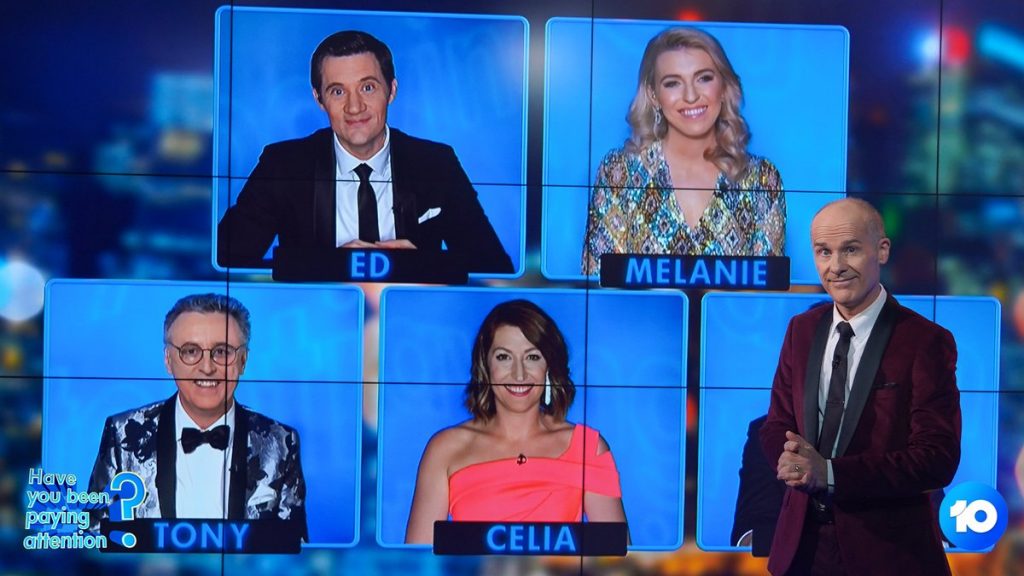
Working Dog have been fond of the daggier aspects of culture – especially Australian culture – since the days when you could make comedy programs based almost entirely around making fun of daggy Australian culture. Sadly, Australian culture is in short supply these days, which is why HYBPA? looks globally for its subject matter. But you can’t get much daggier than a TV game show, and HYBPA? has proven to be the perfect match – and just possibly final resting place, as they’re all edging closer to retirement age and the show shows no signs of stopping – for their not inconsiderable comedy talents.
The merits of HYBPA? are on display pretty much every week. The pace is fast, the jokes are decent, it doesn’t take itself too seriously, and the roster seems to have settled down, making each week’s show much more of a sure thing than it used to be back in the day when it was more of a celebrity showcase. Even the complaints about the jokes seeming “too scripted” seem to have faded away, though you’re on a pretty safe bet a lot of the time if you expect two comedy answers before the correct one.
It definitely doesn’t hurt that Tom Gleisner is a truly great host, which is to say he keeps the pace fast, his jokes are decent and he doesn’t take himself too seriously. He’s the rare Australian game show host – and probably the only Australian comedy game show host – who acts like the show itself and not just his own screen time is what’s important. Whether it’s thanks to his lengthy career or being one of the show’s producers, he’s a funny guy who knows that as the host he’s there to support the guests, which goes a long way towards making the whole effort run smoothly.
Much like Gleisner himself, the show’s off-screen achievements often fly under the radar. For one thing, it’s the show that destroyed the ABC’s attempts at panel comedy. If you’ve ever wondered why, with the ABC currently struggling to afford programming more complicated than pointing a camera at a wall, they haven’t stuck a bunch of comedians up against that wall and got them to banter away for half an hour a week, you have HYBPA? to thank.
Up until relatively recently, we’d get a handful of shit comedy panel / game shows on the commercial networks each year – remember Behave Yourself? Cram!? Those shows Rove would do with little kids? But while both Seven and Ten would occasionally try a bit of late night panel comedy then quickly pretend it never happened (unless it was sports related, in which case it’d run for a decade), the ABC – no doubt inspired by the UK’s seemingly never-ending range of comedy panel shows and the glory days of Good News Week and The Glass House – wouldn’t let go of the comedy panel concept.
Spicks and Specks worked; Gruen is a television series they still put to air. But otherwise? Even the ones that were good weren’t that good, and the ones that were bad were awful. Randling? Tractor Monkeys? How Not to Behave? At least one of Peter Helliar’s sports shows? Having HYBPA? corner the market was a mercy, and it wasn’t until Hard Quiz – which is no more comedy than that run of early evening quiz shows hosted by Paul McDermott that everybody’s forgotten – that the ABC managed to keep a prime time quiz show alive.
In theory, of course, there’s room for more than one comedy panel show on Australian television. The talent is definitely there, and it’s not like putting some comedians behind a desk is expensive television. But thanks to close to a decade of what can only be described as “fucking it up”, the ABC is out of the panel show business. This was sweet relief in 2017, but now? They should maybe take a look at all those former HYBPA? regulars who can’t get a gig this year* and think about taking another crack at it.
If nothing else, HYBPA? has shown that the way to make a comedy panel quiz show work is balance. Panel shows often go after big name guests and deliver a bunch of aimless banter; quiz shows focus too much on the questions; game shows end up taking a third of the show explaining the rules. What needs to come first is comedy: get that right – make sure you go for people who are funny and give them a format where every joke counts – and the show takes care of itself.
Here’s hoping HYBPA? keeps on showing the rest how it should be done for another 200 episodes.
.
*ha ha, who are we kidding – a 2020 ABC comedy panel show would be Benjamin Law, Annabel Crabb, a couple of ex Triple J announcers, Ray Martin, some head of a literary festival and your host Joe Hildebrand
Is it just us, or has Shaun Micallef been losing his grip a little lately? Not that he’s ever really been known for his iron grasp on things, but the occasional smirk at an over-the-top performance has, in recent weeks, seemingly blossomed into a lot of near-corpsing in the face of what’s become a regular installment of “let’s see who can make the host laugh”.
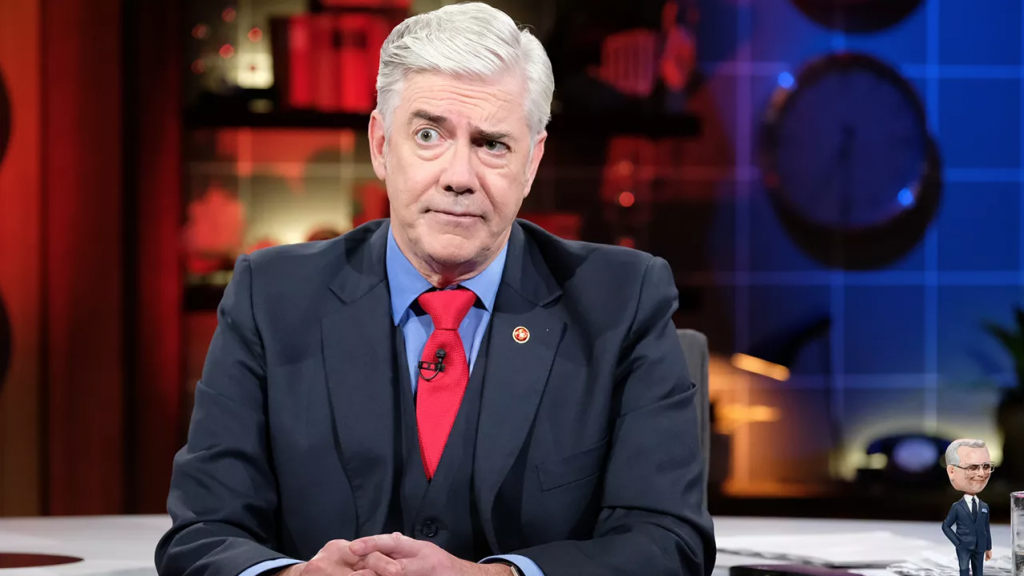
Weirdly for a news satire program, this isn’t really a bad thing. Micallef has never pretended to be a “real” newsreader, let alone whatever it is that Charlie Pickering is doing on The Weekly, so there’s no character to break by breaking character. And it’s never the kind of forced laughter that, well, we’ve already mentioned Charlie Pickering once in this paragraph. Faced with a laughable performance, he laughs: what’s wrong with that?
Usually a run of breaking character by laughing (aka “corpsing”) is less than ideal because it turns the performance away from the audience: they’re making each other laugh, not us. But Mad as Hell has a slightly different feel to it. It’s not as ramshackle as, say, The Late Show was (that was a show where the comedy was almost entirely based on the idea of “look how pissweak this is”), but there’s definitely an element of watching a group of performers putting on a show that’s not quite as polished as it could be.
In those circumstances, occasionally breaking character to laugh at an extra hammy slice of performance is as much part of the show as dodgy wigs and wobbly sets. No doubt the lack of an actual audience at the moment plays a part too – performers love a reaction, and if there’s not a crowd handy to give them one it’s hardly surprising that they’re going after laughs anywhere they can find them. And having people actually laughing during a comedy show? Not a bad thing.
(they’re hardly playing characters that demand a subtle touch either. Not every interview subject requires a performance dialled up to 11, but when they do the cast aren’t going to hold back)
Over the last few years Mad as Hell has quietly expanded its approach. It’s been taking advantage of the ABC’s dwindling comedy output to push things, safe in the knowledge they won’t be infringing on anyone else’s turf. Not that telling topical news stories through the medium of interpretive dance was ever a regular feature on, say, Tractor Monkeys, but there is a bit of a sense that, as the last comedy program left on the ABC, they might as well take advantage of all the tricks nobody else is using.
One of those tricks is to invite the audience in by making the occasional dud moment part of the performance. Sometimes a comedy (especially a parody) has to be flawless to work; other times, being a little rough around the edges makes the end result more grounded and welcoming. Mad as Hell is the latter, and Micallef occasionally over-reacting to an especially egregious piece of over-acting is just one more way to get a laugh at home.
Or, you know, they’re all cracking under the strain of Melbourne’s lockdown. If that’s the case, look out for a rash of sketches in the next few weeks that end with the men in white coats turning up to take away someone from the cast. That stuff’s always comedy gold.
So Channel Ten’s finally realised they still have the Australian version of Drunk History on the shelf and figured they’d slot it into the coveted “stand up clips from that Canadian comedy festival” slot. Has anyone ever mentioned before just how good-looking most American stand up comedians are? It’s like it’s an audition for a television gig or something.
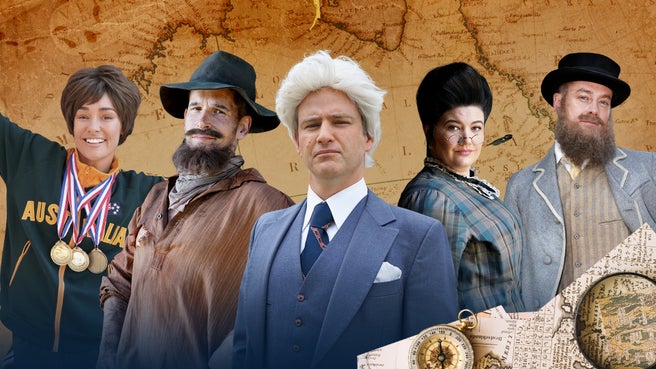
We said just about everything we had to say about Drunk History Australia back when 10 made it available online back in April:
Drunk History Australia isn’t always hilarious, though, as its charm depends a lot on whether the comedian telling the story is the sort of person you’d like to get pissed with. Something which is especially important if you, the audience, happen to be sober.
Basically it’s a show that has its moments, though possibly not enough of them to make it any kind of classic. It’s hamstrung a little by the way it feels like this format’s moment has passed, what with True Story with Hamish & Andy already having made a pretty good local fist of the “check out this wacky tale” genre a few years earlier, followed by 10 giving this (and season 2 of How to Stay Married) the binge treatment on their website half a year ago. People who don’t have the internet, finally your chance to laugh has arrived.
(Comedy Central has also just gotten around to axing the US TV version after six seasons. Guess they finally ran out of both booze and history)
But just because it feels like the product of a previous administration (the pilot aired in 2018) and there’s pretty much zero chance of their being a second season and The Weekly tried to get in on the act with that occasional segment about forgotten but true tales from history and Shaun Micallef already spent three hours earlier this year sadly informing us that drinking isn’t funny with Shaun Micallef’s On the Sauce doesn’t mean this particular run at the concept isn’t worth a look.
For one, it’s often pretty funny. And these days, who’s going to say no to that?
Finally, an international Aussie comedy success story that we won’t have to pretend never happened in a decade or so:
There are just a handful of independent production companies with three or more half-hour series currently on U.S. television. One of them could surprise you: It’s Australian indie Jungle Entertainment, owned by CEO Jason Burrows, director Trent O’Donnell, writer Phil Lloyd and COO Chloe Rickard.
You know Jungle, the artists formerly known as Jungleboys: they’re the producers behind Squinters, the various Moody series, No Activity, Sando, Here Come the Habibs and of course, The Elegant Gentleman’s Guide to Knife Fighting.
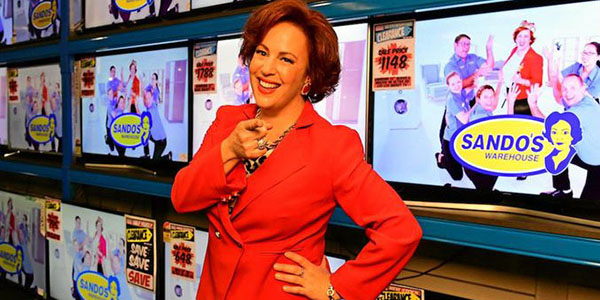
Basically, they’ve been at the heart of Australian scripted comedy, especially on the ABC, for most of the past decade. Unfortunately, most of the scripted comedy on the ABC for the past decade has been shithouse. Slightly surprisingly, this article provides some clues as to why.
Jungle, whose portfolio to date includes 12 comedy and drama series and documentaries, is currently prepping two more of its Australian formats for American adaptations: drama Bad Mothers and comedy Squinters. They also are looking to begin producing series for the U.S. market in Australia — shows they originate as well as shows from American creators and producers — offering creative input in addition to attractive tax Australian incentives, lower production costs and a safe environment for filming during COVID-19.
Unlike Australia, where the networks often act like they’re doing us a favour by even bothering to make Australian programs, Hollywood is a content creating machine. They are constantly scouring the world for anything they can use to create more television: actors, concepts, formats, you name it, they’ll use it.
If you’ve ever wondered why clearly average Australian actors can go to America and make a go of it – that it’s somehow easier for Australian actors to make a living acting in another country entirely than it is in their home industry – you’ve probably thought about it too much. It’s like living in a small country town and wanting to be an astronaut: sometimes the good jobs are somewhere else.
But one thing that does help in Hollywood is giving the power brokers something to look at. There are a number of reasons why movies based on comic books are currently a big deal, but one that doesn’t get mentioned often is that making a comic book first for your movie idea gives you a big advantage – a comic is something a producer can read and go “ahh, I get it”. And what’s better than a comic book?
“Generally, our best-selling tool has been the Australian version of the show that we’ve made, and when we’ve managed to sell the formats, it tends to be that as much as we’re selling the format, we’re also selling the voices behind them,” Lloyd said. “We’re not as much in the business of making a format and sort of just pushing it out off a cliff into other territories as much as being able to be creatively involved.”
Hollywood has next to zero interest in actual overseas shows: they’ll just take the ideas and make their own version. So being a production company who can turn up with shows that the money men can actually watch (ten minutes of) is a huge advantage.
Of course, first the production company has to make their own version so they have something to sell, and if they want to stay involved it really, really helps to have a presence in Hollywood: if you’ve ever wondered why Squinters – an Australian series that was filmed entirely inside cars inside a studio with a green screen background behind them – was half filmed in LA, you’ve been reading this blog too often.
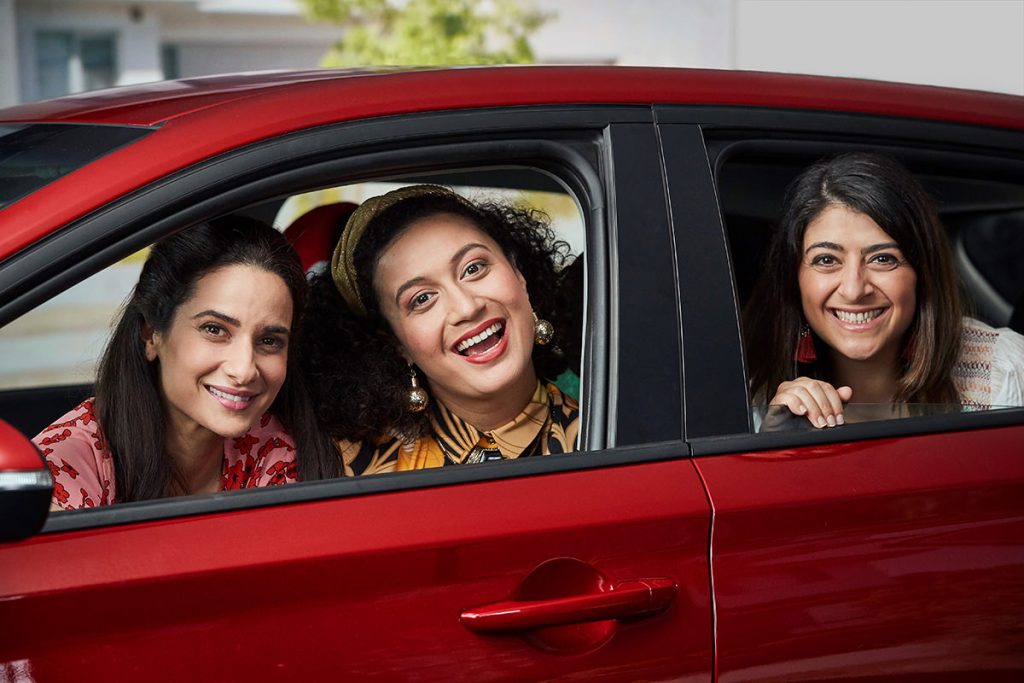
We’re not saying that Jungle made their local products as basically test reels for ideas they wanted to sell to the US, nor are we saying that being able to make them in-house on the cheap made them attractive to the ABC. But even if we were, why would that be a bad thing? The ABC is broke: cheap programming is better than no programming, and considering the web of funding deals that lie behind every single local show that makes it to air in Australia, having a company show some faith in their own ideas makes for a refreshing change.
“At the moment we’ve got new film and TV production incentives that add up to 30% of qualifying Australian expenditure. We’ve got a very competitive exchange rate now. We’ve got very, very low COVID-19 cases in New South Wales. We’ve also got very film-friendly regulations, and we have world-class infrastructure, studios and talent. We’ve got more talent home now than we’ve ever had, obviously, because COVID has been so terrible in a number of territories, including the U.S.”
If there is a problem with all this, it’s this: if a production company is pitching cheap shows to the ABC with an eye to recouping from overseas sales, and if the cash-strapped ABC is happy to say yes to shows made by a production company that can keep overheads low, at what stage do the viewers become relevant? Because if the deal is you make shows for cheap, persuade the cheap-content-needing ABC to put them to air, and make your money back by selling the now proven shows to Hollywood, it seems like the actual quality of the shows stops being much of a factor.
Obviously, this is just crazy speculation on our part. It’s not like there’s been a steady decline in the quality of Jungle’s comedy output over the last decade or so. Sure, Review with Myles Barlow was great, then the various Moody series were just maybe okay, then Squinters and Sando were shit, but it’s not like we’re saying the more successful they’ve been commercially the less successful their comedies have been as comedy. Definitely not.
Whatever’s really going on, there’s no denying it’s working out for them; this article is just another sign of their success. And it’s not like they’re only churning out crap: Mr Inbetween, despite not really falling under our remit, is a pretty decent crime series (though the creative input of the original creator and star, who is not a member of Jungle, plays a big part there).
But the way things are set up, there’s simply no incentive to made good shows here: just come up with a cheap idea that’s flexible enough to work when remade with US talent and everybody wins.
Apart from the chumps watching the end result.
Press release time!

This came as a bit of a surprise here, as we’d thought he’d nabbed the top job months ago:
Producer Todd Abbott (Please Like Me, Micallef Tonight, Geoffrey Robertson’s Hypotheticals, Judith Lucy’s Spiritual Journey, Rove) is the hot tip to join the Entertainment and Specialist division.
ABC has been without a Head of Comedy since Rick Kalowski departed in February.
And just look how well they’ve been doing since then! Seriously, we’d hazard a guess there was more new comedy commissioned this year (what with the rush of corona comedy) than the last… three years of Rick Kalowski’s reign, so somebody must have been left behind to push the big red button marked “go”.
Anyway, big congratulations to Todd Abbott, who clearly has an extensive resume as far as decent comedy goes* and also Please Like Me. Maybe he’ll bring back The White Room! Finally its time has come.
Of course, these days at the ABC The White Room would literally be just an empty white room, as they don’t have the money to put anyone in it. It’s not exactly a good sign that he’s taking on the job (if he is actually starting this week; we’re going by a media newsletter, not an official announcement) at a time when the ABC can’t even manage 90 minutes of new comedy content on a Wednesday night.
Not that he’ll be responsible for the majority of the ABC’s “comedy” line-up either. For a while now the ABC’s increasingly shoddy Wednesday night has been roughly as follows: one game show or lightweight interview thing at 8pm, one news satire show at 8.30pm, and one sitcom. sketch show or slightly more serious interview thing at 9pm. Things may have changed since we last knew what we were talking about, but from what we remember of how things work, out of these three, only the scripted comedy – sketch or sitcom – counts as “Comedy”; everything else is light entertainment, including Mad as Hell and The Weekly.
Things could obviously be worse – it’s not like Abbott has arrived threatening to “axe left-wing comedy” like in the UK – but you couldn’t seriously say ABC Comedy is in glowing health. It’s hard to know exactly why the comedy department shrank so severely under Rick Kalowski’s leadership. We weren’t the first to note that practically nothing new was commissioned during his tenure; whether that was thanks to dwindling budgets or a decreased appetite for risk from head office we don’t know.
What we do know is that without a couple of rushed-out lockdown series the only ABC sitcom this year would have been season four of Rosehaven, and we’ve yet to hear anything that makes next year sound any more promising. Hopefully Abbott’s brought a truckful of money with him; without that, those repeats of Utopia are going to become permanent fixtures.
.
*It’s interesting to compare his resume – which is mostly talk shows and live stand-up recordings, AKA the cheapest possible comedy television you can make and still be making both comedy and television – with Rick Kalowski’s, which was mostly based around (very broad) scripted comedy. Around the time Kalowski was hired there was a bit of talk that bringing him on board was going to signal a new direction for ABC comedy towards more mainstream fare; that didn’t really happen, but if we assume a Head of Comedy’s past work is an indication of where the ABC sees its comedy future, then it looks like they don’t expect a boost to the budget any time soon.
So ends another series of the slight, very slight, adventures of Emma and Daniel in Rosehaven. And by Rosehaven standards, this episode was action-packed.
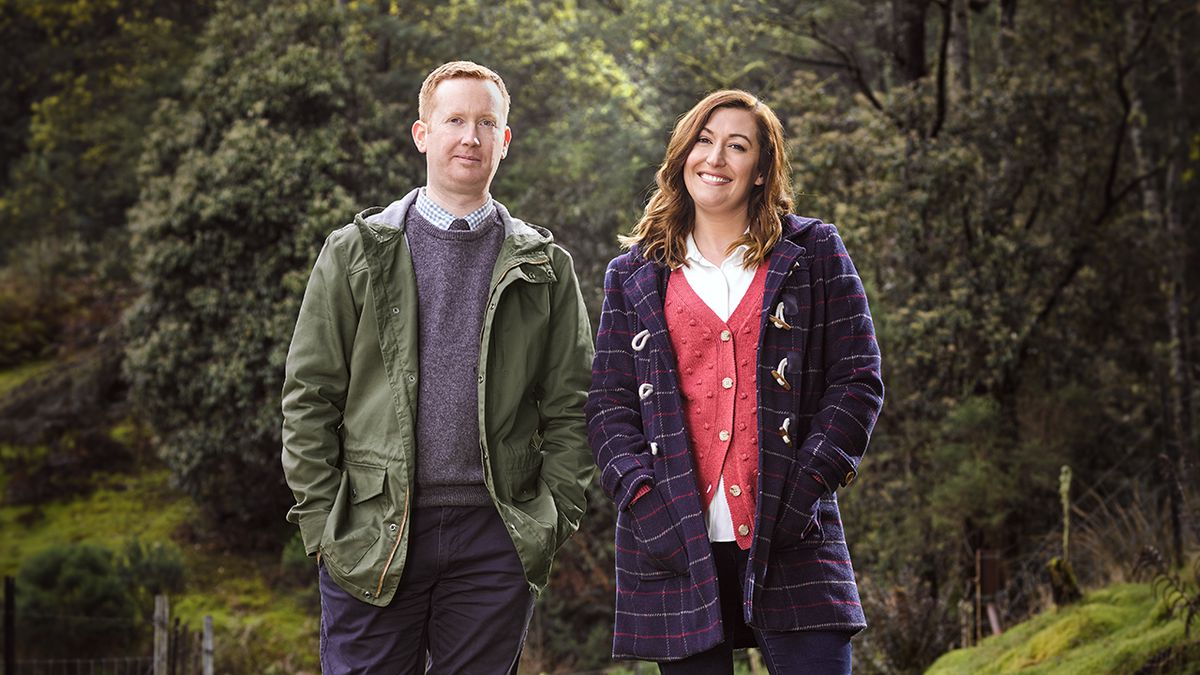
Four episodes previously, Emma (Celia Pacquola), Daniel (Luke McGregor) and Barbara (Kris McQuade) had attended a regional real estate conference, where they’d met big-shot agent Donovan (Josh Quong Tart), who’d tried to head-hunt Barbara for his agency. Now Donovan’s arrived to set-up shop in Rosehaven, is spending big on marketing and has even shouted the entire town a drink. How can our heroes at McCallum Real Estate compete with that?
Like we said, as episodes of Rosehaven goes, this was high stakes. Or had any sort of stakes at all. Usually, Pacquola and McGregor fill their allotted 25 minutes with little more than a flimsy plot (half the town’s on work experience), some pointless banter (we have double chins and we should do something) and the odd zany character, such as Anthony Morgan as local idiot, Phil.
Phil’s occasional appearances are especially welcome, as they provide almost all the best comic moments. In last week’s penultimate episode, when half the town seemed to be on work experience, Phil volunteered to let local cop Greg (Phil Hardwick) show his work experience kid what it’s like to arrest someone. Cut to a few seconds later when Phil decides to let the kid see what it’s like when an arrested criminal escapes, and runs off, still in Greg’s handcuffs, hotly pursued by Greg who doesn’t find this at all amusing.
In this series finale, sadly, there was very little Phil. But there was a nice moment where Phil tried to drink all of Donovan’s bar tab himself. Ah, Phil, if only he was in the show more often…
Rosehaven’s problem is that the style of comedy it revels in – not much happening – is also its greatest problem. And we, the audience, need something to happen. A decent plot to keep us watching, for instance. And this week aside, there haven’t been a lot of those this series. That and sometimes it’s a bit grating when Emma and Daniel start up on the banter. Yeah, OK, it’s fun when you’re doing it with your friends down the pub (or more latterly on Zoom), but it can get a bit draining when you’re watching third parties do it.
But four series in, who’s going to listen to us critiquing the signature style of a sitcom which has got four series and will no doubt get a fifth. So, see you in a couple of years for our review of series five, when we’ll be making all these points again.









